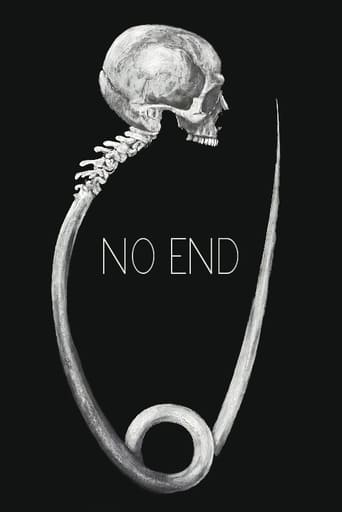



Beautiful, moving film.
I didn’t really have many expectations going into the movie (good or bad), but I actually really enjoyed it. I really liked the characters and the banter between them.
View MoreThis film is so real. It treats its characters with so much care and sensitivity.
View MoreThe story, direction, characters, and writing/dialogue is akin to taking a tranquilizer shot to the neck, but everything else was so well done.
View MoreWhat has been seen of Krzysztof Kieslowski (almost all his films and 'Dekalog' in its entirety) all ranges between very good (the 8th episode of 'Dekalog') to masterpiece ('Three Colors: Red' and 'Blue' and the whole 'Dekalog' series). To me, he was an immensely gifted director, who died far too early.'No End' is not one of Kieslowski's best, but like 'Camera Buff' it is another early film of his that deserves more love and attention. It may be alienating and strange to some viewers (its, as reasoned, pro-solidarity sentiments must have been reason enough for it to not be released internationally for over a year) and his more international work is somewhat more accessible. However, while some of the political story could have had more clarity in places, 'No End' is great in many ways with all the typical Kieslowski strengths that make his films so good.As was always the case in Kieslowski's work, 'No End' is made exceptionally. As well as being beautifully shot with atmospheric use of colour to match the mood, it is gritty yet beautiful with many thoughtful and emotionally powerful images and little things lingering long into the memory. Kieslowski's direction is quietly unobtrusive, intelligently paced and never too heavy. The music is suitably intricate.It's a thought-provoking film in writing, as ever thematically rich and with complex characters, and resists the trap of rambling. The 3-part story is intriguingly told, and while the political story could have done with more clarity the emotional story is harrowing and affecting and the metaphysical story fascinating. 'No End' is always engaging and suitably challenging. The acting is as always from Kieslowski marvellously nuanced and natural, especially from heart-wrenching Grazyna Szapolowska.Summing up, not among the best work of Kieslowski but deserves more love as a result of being overshadowed by his later stuff from 'Dekalog' onward. 9/10 Bethany Cox
View MoreThe films by Krzysztof Kieslowski can be separated into two parts; the Polish films and the international films. The Polish films were concrete and filled with the mirthless Polish reality. The international films (the last four) were much more absurd, ethereal and characterized with aesthetic styling. In 1985 Kieslowski was already very appreciated in the European art-house cinema due to his international breakthrough, Camera Buff in 1979. No End was his first film with the screenwriter Krzysztof Piesiewicz and composer Zbigniew Presiner, with whom he continued working in all of his later film.Poland is under martial law and Solidarity is banned. A woman's (Ula) husband suddenly dies, who was a lawyer of an opposition activist. After his death Ula realizes how much he meant to her and begins to love him more and more. The activist needs another lawyer and Ula recommends an older more experienced lawyer, who has a much more calm approach. While the trial goes on Ula tries to get rid of the ghost of her husband. She tries hypnosis, sex and oblivion - but in the end is forced to commit a suicide - the only way out.A very overwhelming thing in No End is the fact that Ula must commit a suicide. There is no other way out of the system, there is no end for the yearning of love and peace. Killing herself and leaving her young boy alone is the only way for her to live, to have peace and to get rid of the ghost. The last shot where she walks among her husband is very paradoxical.Krzysztof Kieslowski says in his interview book, Kieslowski on Kieslowski that it was very hard to get No End on the screens. WFD (The Government's documentary film office), which usually allowed and financed the films in Poland, wasn't interested. It didn't want a film to show Poland giving false sentences under martial law. After Kieslowski got the production rolling with Piesiewicz WFD didn't want to pay the salaries for the cast & crew. Kieslowski had to go there himself to demand them to pay for their work - at the same he, of course, denied to take money for himself. When the film finally was ready the Government, the church and the critics hated it and it was very hard to see. But the audience, the people who actually saw it loved it. They said that it was the best description anyone had made about the martial law in Poland.Watching No End today is very interesting and I think it has gained more value in the course of time. It's an incredibly realistic description of its time and it shows how sad things were back then. "During the martial law we all weighed our heads. And my generation never raised its head back up." Krzysztof Kieslowski. Even that I am familiar with kieslowskian pessimism and it can be seen in all of his films, I think No End is his most pessimistic picture of the Polish reality. The whole movie and especially the ending shows us that there is no hope and No End for all this.Kieslowski said that the biggest flaw of No End was that it had three separate parts and it didn't work as an entirety. The political part, where the activist tries to choose whether to fight or fall. The emotional part, where the woman falls in love with a dead man and finally the metaphysical part, where the dead man takes contact with the living. I think all of these different things work brilliantly and do no harm on the film. Metaphysics is a branch of philosophy, which tries to explain the fundamental nature of being and to my mind in addition to this Kieslowski tried to study the true nature of love.The acting and the cinematography of No End is very raw, brutal documentary. This incredible concreteness Kieslowski was able to achieve in Dekalog and No End was because of his long experience with documentaries, which he had made seven of. The nature of the film changed during the process; in the beginning Kieslowski intended to make a film about guilt and at sometime he was going to title the film, Happy Ending due to its final shot with the man and the woman walking together. But in the end No End is a philosophical film, a picture of reality and its time, a paradox of politics and a study of the true nature of love.As is the film so is the title very complex and it has many purposes. I think the title works for all of the three different parts. There is No End for the martial law and oppression; the activist is unable to fight against the Government. Nor is there end for the being of man and the love of the woman. There is No End in sight.
View MoreI state for the record that I did not understand this film fully. The second plot with Solidarnost protester imprisoned and released by the court is not completely clear to me. Yet it has little to do with politics and more with human condition (ideals, expectation, compromise). Prisoner's family doesn't react happily upon his immediate release in a court room. There is awkwardness and embarrassment in that scene, as if some unforgivable compromise has been made and it tainted all of their relationship. Accident scene with a death of motorist seems random but reoccurring theme in Kieslowskij movies. Randomness of death, randomness of existence. Movie is wonderfully shot , music (as always) is haunting. I just cannot put it all together in my mind like I could with Veronique.
View MoreThe narrative in this film is far too flawed. There are two intertwining halves of it, one good, one poor. The good one involves a woman, Ulla, whose husband died suddenly and unexpectedly one morning while he waited in his car to take their son to school. Now he gently haunts his family as they deal with the pain. The acting is magnificent here. Kieslowski is masterful at directing his actors in material like this, as he would show a million different times in The Decalogue, made a few years later. There are a few outrageously and subtly powerful scenes. Most memorable is the one where Ulla decides to prostitute herself to a British tourist. This happens about a month after her husband has died. After the man has sex with her, she asks him if he speaks Polish. He says no, and then she begins to talk about her problems in Polish. The other half of the plot is utterly weak in comparison. The husband was a lawyer, and the defendant in the case he was working on is screwed because of the death. The defendant's wife comes to Ulla for help, and though she is refused help at first, Ulla eventually introduces her to her husband's mentor, a cynical old man about to be kicked out of the business. Perhaps it's just my aversion to lawyer and courtroom dramas, but I just didn't care a lick what happened in this part of the plot. Supposedly it's meant as a criticism against the Communist law at the time. I don't know. It's dull whatever it is. But the film is slightly worth watching, especially for the acting. Even in the parts that I didn't care for, the acting is exquisite. 7/10.
View More